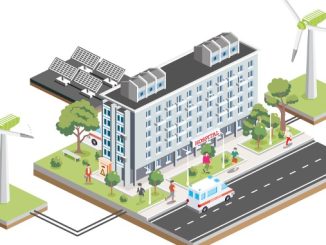
Neil Jennings, partnership development manager climate change and the environment, Imperial College London, and Mala Rao, professor, School of Public Health, Imperial College London, discuss a new report which commits the NHS to net zero carbon emissions by 2040
CREDIT: This is an edited version of an article that originally appeared on The BMJ
History will remember 2020 as the year when the COVID-19 pandemic plunged the world into turmoil, leaving climate change—which had begun to capture greater global attention and concern—consigned to the backroom of global news. Yet this emergency is by far the biggest public health threat we face; since the start of the pandemic we have already moved a year closer to the 2030 deadline to halve global emissions of carbon dioxide, and the 2050 deadline of reaching net zero emissions.
The recent publication of the UK report Delivering a “Net Zero” National Health Service is, therefore, welcome. It sets out the NHS’s ambition to become the world’s first carbon neutral national health system by 2040. The report describes the urgent need for such a strategy; how the carbon footprint, targets and trajectories have been estimated, the interventions planned and the emissions reduction they are likely to achieve, how the recommendations fit within the framework of the NHS Long Term Plan and next steps.
Salas and colleagues’ article in The BMJ is a timely supplement to the report. It offers more detail on how recommendations might be implemented and highlights studies showing the substantial variation in carbon footprints across the health industry, specialties and healthcare interventions and, consequently, the scope for further emissions reductions across these domains.
The bold, transformative NHS Plan involves every relevant sector, from estates and facilities to travel, transport and medicines. It seeks to distil key learning from the rapid changes in service delivery such as digitised care, which COVID-19 compelled the NHS to introduce, and to retain best practice. It also highlights the public health co-benefits which action to reduce carbon emissions will bring—for example, by replacing petrol and diesel with electric or hydrogen vehicles.
Equally creditable is the aim to achieve net zero emissions for the NHS supply chain by 2045. The objective is to make more efficient use of supplies, seek low carbon options and innovations, and encourage decarbonising behaviours among its 80,000 suppliers.
Challenges remain, however. Firstly, large gaps in data and knowledge need to be filled to ensure the accuracy of the carbon estimates and achievement of milestones; for example, the carbon footprints of many medical specialties and treatments are still unquantified. The NHS report acknowledges these uncertainties and the need to revisit and update carbon reduction analyses every five years.
Carbon reduction plans will be implemented as global temperatures rise and trigger more frequent extreme weather events. These changes may increase demand for energy – to provide cooling in hotter summer months, or for flood rescue operation; the report’s call for climate adaptation and mitigation measures to be closely aligned with the net zero agenda is, therefore, welcome. The inclusion of patient and visitor travel in emissions calculations is encouraging, but aviation emissions of internationally recruited staff should also be added, especially when increased overseas recruitment is planned.
After reducing emissions as far as possible, offsetting may need to be considered to deal with residual emissions. The NHS should consider adopting a framework such as the Oxford offsetting principles to provide a clear approach for managing residual emissions and participating in offsetting projects.
Everyone included
The report rightly recognises the importance of staff and public ownership of the plans, but it is silent on the need to democratise this engagement by offering everyone, especially those from ethnic minority backgrounds, the opportunity to contribute. Staff from ethnic minorities make up 20% of the NHS workforce, and many come from low and middle income countries. Despite their experience of delivering healthcare in resource-poor settings, these professionals are largely excluded from planning and service improvement discussions in general.
Ethnic minority communities – whose everyday lives are defined by socioeconomic inequalities and racism – must be at the table. Their insights will ensure that, for example, digitised health delivery does not reduce access to care and widen existing health inequalities. The NHS should draw on deliberative democratic processes, such as those used in the recent UK climate assembly, to help define priorities, ensure that all voices are heard, and secure a just transition to a zero-carbon health service.
Cross-sectoral collaboration, for example, with universities and local authorities, is also essential given the tight timescales and the need to minimise costs, engage with the whole supply chain and avoid organisations duplicating mistakes. The NHS Plan commits to revitalising a national, cross-system group to help co-ordinate action from all organisations involved in delivering its agenda.
The leadership shown in setting a 2040 commitment is admirable and important, not just in reducing emissions but also in sending a strong signal to health services around the world in the lead up to the United Nations Framework Convention on Climate Change summit in November 2021. The summit, hosted by the UK, should be a catalyst for collaboration on healthcare decarbonisation globally.


Be the first to comment